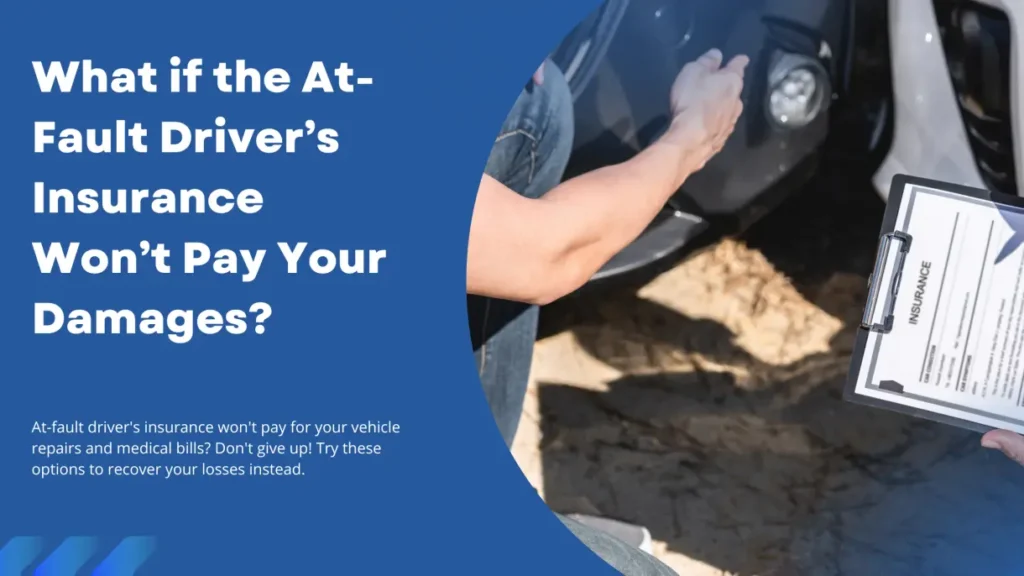You did everything right, from gathering info to getting a police report at the scene of your accident. Even then, the other driver’s insurance company may give a low settlement offer, or even deny your claim outright. If the at-fault driver’s insurance won’t pay for your damages, you have legal options to receive a fair settlement.
The at-fault driver’s insurer always looks for reasons to avoid paying your medical bills and property damage costs to protect their profits. If your car was hit and their insurance won’t pay enough to cover your losses, it’s time to force their hand. You can easily do this by hiring an auto accident attorney.
Ready to see if you may qualify? Click here to get a FREE, no-obligation consultation before starting your claim.
Dealing with a Car Accident Claim When the At-Fault Driver’s Insurance Won’t Pay: Key Takeaways
- Insurance companies deny claims often in order to protect their bottom lines and keep profits high. Working with an attorney who has your best interest at heart can ensure you get a fair settlement offer the first time.
- Accident damages can provide money to pay for your vehicle repairs, medical costs, lost wages from missed work, and even pain and suffering. But without an attorney, car insurance usually covers just 54% of crash costs. That means you must pay the rest of those expenses out of your own pocket.
- In no-fault states, you may have to file a claim with your own insurance company no matter who caused your accident. An attorney can help you better understand how the laws in your state may apply to your own car accident case.
- The #1 reason people fail to get a payout when another driver crashes into them is due to that driver not having any car insurance coverage. The 5 reasons listed below apply in cases where both drivers have an active auto insurance policy.
- Auto accident damages in cases with legal counsel pay up to 3.5x more money than those where injured victims settle directly with insurers. And that’s true after you pay any legal fees you owe.
Most Common Reasons Why an At-Fault Driver’s Insurance Won’t Pay
If the at-fault driver’s insurance issues a denial letter or won’t respond to your requests, don’t panic. Your first step is to find out why the car insurance company issued their denial. Below are the top 5 reasons why an at-fault driver’s insurance won’t pay out, and what to do next.
Reason #1: The Other Driver’s Insurance Company Denies Fault
Car accident cases are often complicated, and the at-fault drivers’ insurance may not settle because they believe you’re partly responsible. And in some types of car accidents (such as those during bad weather or low visibility conditions), fault isn’t always clear.
Cases can get messy when:
- Multiple vehicles are involved, so more than one person may be at fault for the collision
- Car accident victims sustain significant injuries that need ongoing medical care in the future
- There is conflicting evidence about the circumstances leading up to your car crash
If any of these apply in your case, you may end up filing a lawsuit against the at-fault driver. Many people see this step as a last resort in seeking compensation, but it doesn’t have to be.
When the at-fault driver’s insurance won’t pay because they’re contesting fault, that makes hiring an attorney even more crucial. Working with an attorney can help you properly establish fault and give you the highest chance to financially recover.
Reason #2: Not Enough Car Insurance Coverage to Pay All Your Damages
Another reason the at-fault driver’s insurance won’t pay: Maybe the other driver is either uninsured or underinsured. If the other driver has no policy or the wrong type of coverage, you may have to take additional steps, like:
- Filing an uninsured motorist (UIM) or Personal Injury Protection (PIP) claim with your own insurance provider, assuming you have that type of coverage.
- Pursing legal action directly against the driver, like going to small claims court or filing a lawsuit through a personal injury attorney.
According to Insurance Information Institute (III) estimates, uninsured motorists rose from 11.6% in 2017 to 14% in 2022. That means approximately 1 in 7 drivers do not have the minimum insurance coverage required to cover an accident.
UIM can also help cover the difference between an at-fault driver’s limited coverage and the full cost of your losses. In the unfortunate event you don’t have UIM coverage, talk to a lawyer near you who can explain all your legal options.
Reason #3: The Insurance Company Refuses to Pay Due to Policy Exclusions
Insurance companies may not pay you if the policy you file against has certain exclusions that affect your claim’s payout. Here are a few examples of when an at-fault driver’s policy may legally avoid paying you a cash settlement:
- The responsible driver hit you while driving under the influence
- One or more vehicles in the crash were engaging in on-road racing
- Intentional acts of violence (i.e., the other driver intentionally hit you in order to injure you, which can constitute insurance fraud)
- An act of God (i.e., black ice, thick fog, total power blackouts, etc.) played a role in your collision
If any of the above applies in your case, consult an attorney to help you sue the at-fault driver directly if insurance won’t cover it.
Reason #4: Blaming Pre-Existing Conditions for Your Medical Costs
Sometimes, insurance companies won’t pay because they believe pre-existing conditions contributed to your medical bills.
For example, back pain after a rear-end collision may partly be due to an old work injury flaring up. Insurance companies may find reasons to believe your injury started elsewhere and not pay you a full settlement.
That’s when gathering strong medical evidence is key for showing a causal link between your injuries and the car accident.
Reason #5: Lack of Evidence to Support Your Insurance Claim
Insufficient evidence may also help the at-fault driver’s insurance legally deny you a settlement. The insurance company needs lots of proof showing the other driver was at-fault for hitting your car.
Failing to document any of the following could destroy your chances for collecting a cash payout:
- Photo or video evidence from your accident scene
- Testimonies from anyone present who saw the crash happen
- Not having the right contact or insurance policy info for all other drivers involved in the crash
- Failing to report the incident immediately to the police, which may also violate local laws
- Not seeking medical attention for any injuries you say you suffered because of the accident
Therefore, it’s important to understand why the insurer rejected your claim so you can follow up with an appeal contesting it. Insurance denials can also come from bad faith practices aimed towards minimizing such settlements. A lack of evidence is especially harmful if the at-fault driver provides false insurance information.
You deserve to know your legal rights and what legal steps to take next towards receiving compensation for your losses.
What to Do if Your Car was Hit and the At-Fault Driver’s Insurance Won’t Pay
If their insurance won’t pay you and the other driver was at-fault for hitting your car, consider taking these steps.
Find Out Their Reason for Denial
Find out why they denied your claim so you can properly address their reasons in your appeal letter. You can request a written explanation from the at-fault driver’s insurance highlighting why they withheld damages.
If you strongly feel you deserve compensation, you must gather evidence specifically refuting the points in your denial letter. You can investigate the matter further and get more solid evidence for your case by consulting a local car accident attorney.
Build a Solid Foundation with Additional Evidence
After understanding the denial reason, build a solid foundation of evidence in order to support your claim. Crucial evidence for making a successful appeal may include:
- Your most recent medical records (if you have pre-existing conditions) or proof you sought medical care for your car accident injury
- Eyewitness testimonies from people who were present at the accident scene
- Official police report documenting the collision details
- Proof of lost income for missed work
You need solid backing before writing an official demand letter disputing their claim denial.
Submit an Official Demand Letter
Once you have more evidence, you can submit an official demand letter to the insurance company explaining why you deserve compensation. Include all evidence and if that appeal fails, don’t give up just yet. Instead, try having an attorney negotiate with the insurance company on your behalf.
Work With an Attorney Throughout the Process
If the insurance company is uncooperative or continues to deny your claim, you may need an attorney. A personal injury attorney specializing in auto accident cases can assist you during the claim process and handle your appeals.
File a Complaint With Your State’s Department of Insurance
If the insurance company will not respond, you may also file a complaint with your state’s Department of Insurance. That way, the agency can mediate between you and the insurance company regarding your claim. They can also force a meeting between both parties if you cannot reach a resolution leading up to deadline for claims in your state.
Pro Tip: Search the National Association of Insurance Commissioners (NAIC) website for your state’s agency contact info or to file a complaint.
Prepare for Litigation if the At-Fault Driver’s Insurance Won’t Pay Otherwise
If the insurance company continues to avoid paying your claim, you may proceed to litigation in an effort to settle. An attorney can guide you through the auto settlement timeline and represent you in court, if needed.
In most cases, you must pursue this type of legal action within two years of your accident date. However, you should look up your state’s laws and statute of limitations so the courts won’t automatically reject your case. The defendant has up to 30 days to respond when you file suit.
Avoid These Bad Faith Practices From Insurance Adjusters
Sometimes, it’s difficult to discern an insurance adjuster’s use of underhanded tactics to lowball your settlement or avoid a payout. Some common bad faith tactics that claims adjusters use are:
- Delayed responses to accident victims and dragging out claims
- Requesting an excessive amount of repetitious documents
- Wrongly denying valid claims
- Lowballing initial settlement offers
- Failing to communicate with the policyholder
- Falsifying or concealing policy information
- Denying claims without a valid investigation or permitted jurisdiction
If you experience these tactics from an insurance adjuster, consult an auto accident attorney immediately. The claims adjuster may avoid paying you or minimize your settlement to protect the company’s profits.
Fight for Your Rights with an Auto Accident Attorney
If you get hurt in an accident and it is another driver’s fault, get a free consultation from an auto accident attorney near you. Not sure how to find a personal injury attorney who specializes in car insurance claim disputes? Our network of experienced attorneys who can help you take legal action.
All auto accident lawyers we work with provide free, no-obligation case evaluations to help you decide if you need legal representation. They also provide legal counsel on a contingency basis. That means if your claim results in denial, then you pay $0 in legal fees. But if you’re successful, then you only owe one small fee out of your final settlement award.
Ready to see if you may qualify? Click here to get a FREE, no-obligation consultation before starting your claim.

